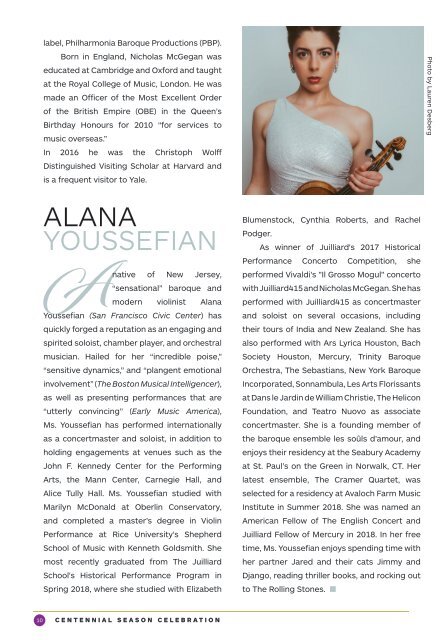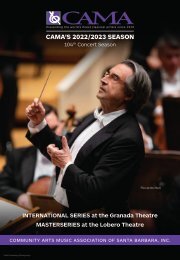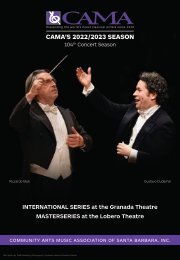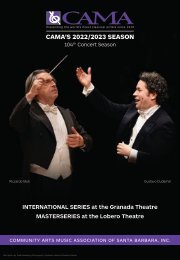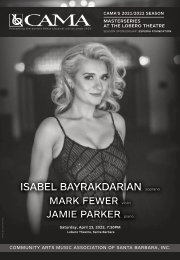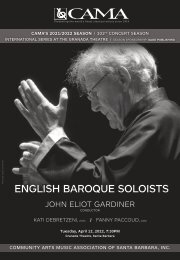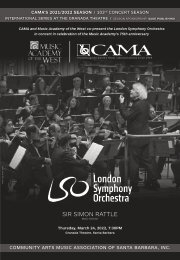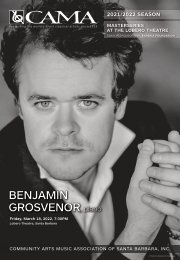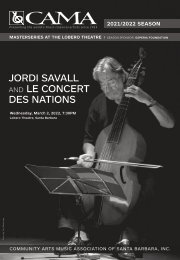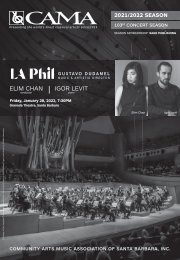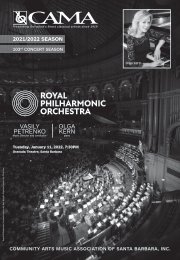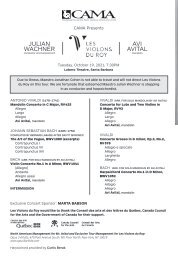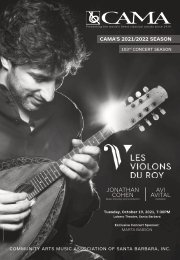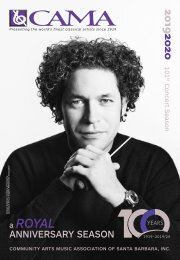Philharmonia Baroque Orchestra—February 5, 2019—CAMA's International Series at The Granada Theatre—Centennial Season
TUESDAY, FEBRUARY 5, 2019, 8:00 PM Philharmonia Baroque Orchestra Nicholas McGegan, Music Director Rachel Barton Pine, violin Renowned as an interpreter of a wide range of classical music, English-born conductor Nicholas McGegan was appointed Officer of the Most Excellent Order of the British Empire (OBE) for “services to music overseas” by Queen Elizabeth in 2010. He has served since 1985 as Music Director of the Philharmonia Baroque Orchestra, establishing it as the leading period performance ensemble in the United States. The Philharmonia is dedicated to capturing the spirit and distinctive sound of music from the Baroque to the early Romantic periods using authentic instruments and stylistic conventions. American violinist Rachel Barton Pine, the youngest-ever gold medal winner of the International Johann Sebastian Bach Competition, will join the orchestra for the rarely performed Violin Concerto in D major of violinist Franz Clement (one of Beethoven’s closest friends, for whom he composed his own Violin Concerto in D major). PROGRAM: Wolfgang Amadeus Mozart: Overture to The Marriage of Figaro, K.492 Franz Clement: Violin Concerto in D Major (1805) Franz Schubert: Symphony No.6 in C Major, D.589 PRE-CONCERT LECTURE BY ANDY RADFORD, MUSIC DIRECTOR, SANTA BARBARA YOUTH SYMPHONY; AND LECTURER, WOODWIND, BRASS & PERCUSSION PROGRAM, UCSB DEPARTMENT OF MUSIC Lecture will begin at 7:00 PM; doors to The Granada Theatre will open for the lecture at 6:45 PM. Lecture seating is limited to the first 100 patrons. First come, first served. #CAMASB #CAMAat100 #CAMACentennial
TUESDAY, FEBRUARY 5, 2019, 8:00 PM
Philharmonia Baroque Orchestra
Nicholas McGegan, Music Director
Rachel Barton Pine, violin
Renowned as an interpreter of a wide range of classical music, English-born conductor Nicholas McGegan was appointed Officer of the Most Excellent Order of the British Empire (OBE) for “services to music overseas” by Queen Elizabeth in 2010. He has served since 1985 as Music Director of the Philharmonia Baroque Orchestra, establishing it as the leading period performance ensemble in the United States. The Philharmonia is dedicated to capturing the spirit and distinctive sound of music from the Baroque to the early Romantic periods using authentic instruments and stylistic conventions. American violinist Rachel Barton Pine, the youngest-ever gold medal winner of the International Johann Sebastian Bach Competition, will join the orchestra for the rarely performed Violin Concerto in D major of violinist Franz Clement (one of Beethoven’s closest friends, for whom he composed his own Violin Concerto in D major).
PROGRAM:
Wolfgang Amadeus Mozart: Overture to The Marriage of Figaro, K.492
Franz Clement: Violin Concerto in D Major (1805)
Franz Schubert: Symphony No.6 in C Major, D.589
PRE-CONCERT LECTURE BY ANDY RADFORD, MUSIC DIRECTOR, SANTA BARBARA YOUTH SYMPHONY; AND LECTURER, WOODWIND, BRASS & PERCUSSION PROGRAM, UCSB DEPARTMENT OF MUSIC
Lecture will begin at 7:00 PM; doors to The Granada Theatre will open for the lecture at 6:45 PM.
Lecture seating is limited to the first 100 patrons. First come, first served.
#CAMASB #CAMAat100 #CAMACentennial
Create successful ePaper yourself
Turn your PDF publications into a flip-book with our unique Google optimized e-Paper software.
label, <strong>Philharmonia</strong> <strong>Baroque</strong> Productions (PBP).<br />
Born in England, Nicholas McGegan was<br />
educ<strong>at</strong>ed <strong>at</strong> Cambridge and Oxford and taught<br />
<strong>at</strong> the Royal College of Music, London. He was<br />
made an Officer of the Most Excellent Order<br />
of the British Empire (OBE) in the Queen’s<br />
Birthday Honours for 2010 “for services to<br />
music overseas.”<br />
In 2016 he was the Christoph Wolff<br />
Distinguished Visiting Scholar <strong>at</strong> Harvard and<br />
is a frequent visitor to Yale.<br />
Photo by Lauren Desberg<br />
ALANA<br />
YOUSSEFIAN<br />
A<br />
n<strong>at</strong>ive of New Jersey,<br />
“sens<strong>at</strong>ional” baroque and<br />
modern violinist Alana<br />
Youssefian (San Francisco Civic Center) has<br />
quickly forged a reput<strong>at</strong>ion as an engaging and<br />
spirited soloist, chamber player, and orchestral<br />
musician. Hailed for her “incredible poise,”<br />
“sensitive dynamics,” and “plangent emotional<br />
involvement” (<strong>The</strong> Boston Musical Intelligencer),<br />
as well as presenting performances th<strong>at</strong> are<br />
“utterly convincing” (Early Music America),<br />
Ms. Youssefian has performed intern<strong>at</strong>ionally<br />
as a concertmaster and soloist, in addition to<br />
holding engagements <strong>at</strong> venues such as the<br />
John F. Kennedy Center for the Performing<br />
Arts, the Mann Center, Carnegie Hall, and<br />
Alice Tully Hall. Ms. Youssefian studied with<br />
Marilyn McDonald <strong>at</strong> Oberlin Conserv<strong>at</strong>ory,<br />
and completed a master’s degree in Violin<br />
Performance <strong>at</strong> Rice University’s Shepherd<br />
School of Music with Kenneth Goldsmith. She<br />
most recently gradu<strong>at</strong>ed from <strong>The</strong> Juilliard<br />
School's Historical Performance Program in<br />
Spring 2018, where she studied with Elizabeth<br />
Blumenstock, Cynthia Roberts, and Rachel<br />
Podger.<br />
As winner of Juilliard's 2017 Historical<br />
Performance Concerto Competition, she<br />
performed Vivaldi's "Il Grosso Mogul" concerto<br />
with Juilliard415 and Nicholas McGegan. She has<br />
performed with Juilliard415 as concertmaster<br />
and soloist on several occasions, including<br />
their tours of India and New Zealand. She has<br />
also performed with Ars Lyrica Houston, Bach<br />
Society Houston, Mercury, Trinity <strong>Baroque</strong><br />
Orchestra, <strong>The</strong> Sebastians, New York <strong>Baroque</strong><br />
Incorpor<strong>at</strong>ed, Sonnambula, Les Arts Florissants<br />
<strong>at</strong> Dans le Jardin de William Christie, <strong>The</strong> Helicon<br />
Found<strong>at</strong>ion, and Te<strong>at</strong>ro Nuovo as associ<strong>at</strong>e<br />
concertmaster. She is a founding member of<br />
the baroque ensemble les soûls d’amour, and<br />
enjoys their residency <strong>at</strong> the Seabury Academy<br />
<strong>at</strong> St. Paul’s on the Green in Norwalk, CT. Her<br />
l<strong>at</strong>est ensemble, <strong>The</strong> Cramer Quartet, was<br />
selected for a residency <strong>at</strong> Avaloch Farm Music<br />
Institute in Summer 2018. She was named an<br />
American Fellow of <strong>The</strong> English Concert and<br />
Juilliard Fellow of Mercury in 2018. In her free<br />
time, Ms. Youssefian enjoys spending time with<br />
her partner Jared and their c<strong>at</strong>s Jimmy and<br />
Django, reading thriller books, and rocking out<br />
to <strong>The</strong> Rolling Stones. n<br />
Viennese Pivot<br />
PROGRAM NOTES BY BRUCE LAMOTT<br />
Chorale Director and Scholar-in-Residence of <strong>Philharmonia</strong> <strong>Baroque</strong> Orchestra & Chorale<br />
Vienna has been called many things: surrender in May 1814, the diplom<strong>at</strong>s and<br />
“<strong>The</strong> Imperial City,” “<strong>The</strong> City of nobility of Europe g<strong>at</strong>hered in Vienna a year<br />
Dreams,” “Waltz Capital of the World,” l<strong>at</strong>er to sort out the territorial havoc he caused<br />
but rarely, if ever, “<strong>The</strong> Pivot.” Situ<strong>at</strong>ed<br />
centrally in the heart of Europe on the North-<br />
South axis from Amsterdam to Naples and<br />
East-West from Paris to Prague, its musical<br />
significance was approaching its zenith just<br />
in wh<strong>at</strong> is known as the “Congress of Vienna.”<br />
So Vienna certainly has claim to be a<br />
hubcap, but a pivot? Yes, because it is here<br />
th<strong>at</strong> the prevailing style of music gradually<br />
pivoted from the galant propriety of the Classic<br />
as its political significance was plunging to its Period—sometimes called the Viennese<br />
nadir in 1800. Center of the conglomer<strong>at</strong>ion of<br />
countries, city-st<strong>at</strong>es, and dioceses known as<br />
the Holy Roman Empire (in Voltaire’s famous<br />
opinion, none of the above) and ruled from<br />
Vienna by the dynasties of Habsburg and<br />
Habsburg-Lorraine, the Empire was dissolved<br />
by Napoleon in 1808. However, following his<br />
Classical Style—of Mozart and Haydn to the<br />
unabashed personal expression and drama of<br />
Romanticism of Schubert and l<strong>at</strong>e Beethoven.<br />
And like a pivot—as opposed to a turnstyle—<br />
these changes were gradual and fluctu<strong>at</strong>ing,<br />
making the distinction of styles r<strong>at</strong>her fuzzy<br />
until 1820 or so.<br />
10 CENTENNIAL SEASON CELEBRATION CAMA AT THE GRANADA THEATRE - PHILHARMONIA BAROQUE ORCHESTRA 11


